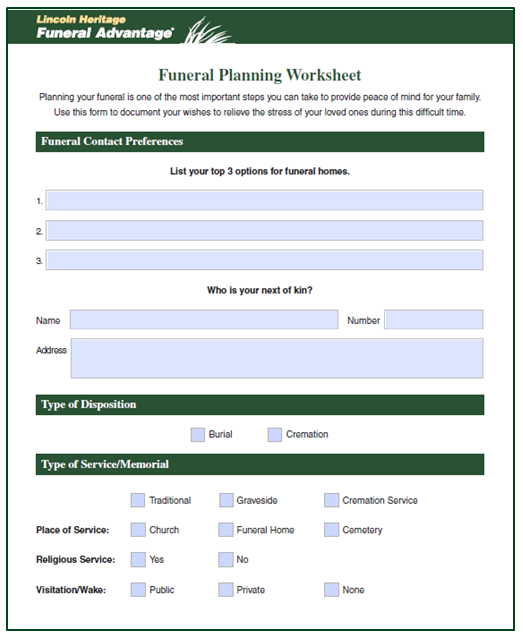Funeral Planning Checklist from Funeral Advantage
Planning a funeral can seem complicated and feel overwhelming, and it usually happens during a very emotional time. A good checklist can help get you over the rough spots and make the process a little easier.
Table of Contents
Make an itemized list of tasks that need to be completed
Mark the tasks that someone else – a relative or a close friend – can help with. The items on this list should be funeral-related only; tasks that deal with the person’s estate or personal belongings should go on another list.
This list can include things like selecting a funeral home, putting together an obituary notice, or arranging transportation for family members.
Call family and friends
One of the most important things to do is get help. Call a couple of close family members and friends who can help you during this emotional time. There will be lots of notifications to make, and they can help you. People who knew the deceased will ask how it happened, when the services are, and what they can do to help. Having a specific person to help you with these calls will make things a lot easier.
Check for documentation of last wishes
Check to see if there is a document detailing the deceased’s final wishes. This could include anything from specifics about the memorial service (such as what music to play) to whether they wished to be cremated or buried.
If the deceased was a veteran, he or she is entitled to Military Funeral Honors at no charge (except in the case of a dishonorable discharge). This can include an honor guard, the folding and presenting of an American flag, and the playing of Taps.
Research funeral costs before contacting a funeral home
The Federal Trade Commission offers extensive funeral tips on its website, including a Funeral Pricing Checklist that can help you calculate costs. You can check average prices online or call local funeral homes to get a general idea of expenses before you go in. Most funeral homes will offer a basic service package, but this typically doesn’t include things like using the funeral home for visitation, using a hearse or limousine on the day of the funeral, or needing staff and equipment for a graveside service.
While researching funeral costs and other burial expenses, you should check to see whether the deceased had a life insurance policy. If they did, it’s important to contact the insurance provider as soon as possible so they can start their claim process. The death benefit from the policy can help cover a lot of the costs you’ll be incurring, but it might not be available in time. Contact the insurance provider to see what options are available.
GET HELP WITH FUNERAL COSTS
Contact a funeral home
When you’ve chosen a funeral home, make an appointment to go over the details of the service. It’s important to take a friend or family member with you. You’ll be asked to make a lot of decisions, and it helps to have someone there to share the responsibility. Here are some of the decisions you’ll need to make:
- Whether the deceased will be cremated or buried
- Selection of a casket and burial vault or cremation urn
- What kind of service to have and where
- Whether there will be a viewing or family visitation
- The clothing and jewelry the deceased will wear
- Floral arrangements, music, and passages to be read
- Funeral transportation for the family
- The final resting place
Prepare the funeral service
If there is a specific person you’d like to perform the service – or place you’d like a part of the service held – make sure someone makes those arrangements for you.
You should also decide who else will participate in the funeral. This includes pallbearers if there is to be a casket, an organist or other musicians, and family members or friends to read passages and give the eulogy.
Part of preparing for the funeral service includes putting together an obituary. Obituaries are a unique place for you to highlight things like when and where they were born, the schools they attended, communities they lived in, jobs they had, and who they are survived by. If you want people to donate to a charity instead of sending flowers, mention that in the obituary.
Funeral planning worksheet
Next steps
Losing a loved one is never easy. Knowing what to do can be overwhelming at times. There are literally hundreds of decisions that must be made.
One of the biggest decisions surviving loved ones have to make is how to handle the funeral arrangements. Unfortunately, families are often unprepared for how much the funeral will cost. Funeral costs have been rising steadily over the last decade. Without the proper guidance, families can emotionally overspend by hundreds or thousands of dollars.
To learn more about how you can manage funeral costs, get a free final expense insurance quote.




